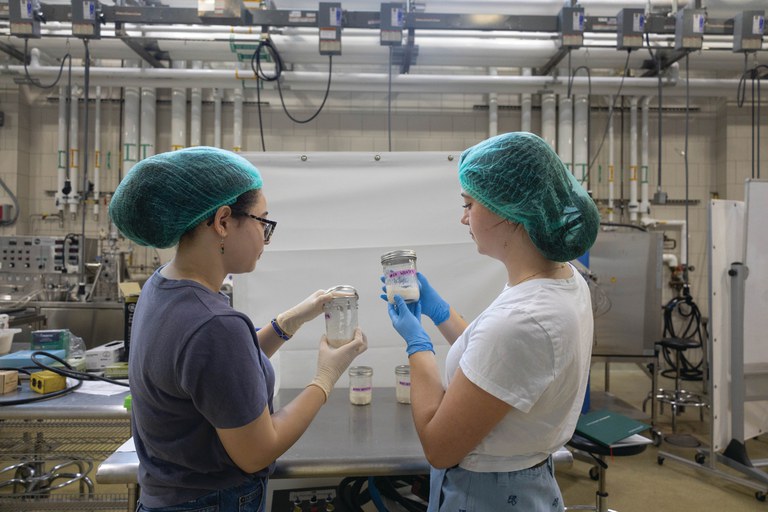Posted: April 3, 2024
Sourdough starter research raises hope for better bread choices

Maya Tanikawa-Brown, left, a Penn State Summer Research Opportunities Program scholar, and food science graduate student Ashley Ohstrom examine sourdough fermentations. Photo credit: Jillian Wesner
People with celiac disease — or intolerance to dietary gluten — may soon have more food options, thanks to an unlikely source: sourdough bread. Sourdough contains less gluten than other breads, making it more tolerable for people with gluten sensitivities. Penn State and Colorado State University researchers are studying whether bacteria in the yeast starter needed to make sourdough bread might help reduce gluten in other bread products.
Gluten is a protein naturally found in cereal grains such as wheat, barley and rye that can trigger an immune response in people with gluten intolerance and celiac disease. The National Institutes of Health estimates that gluten intolerances, characterized by adverse gastrointestinal symptoms upon consumption of gluten-containing foods, affect about 7% of the U.S. population. Of this number, 1% suffer from celiac disease. The incidence of celiac disease has increased by 7.5% per year over the last several decades, mirroring a continually increasing prevalence of all autoimmune disorders worldwide.
Funded by a $500,000 grant from the U.S. Department of Agriculture, co-principal investigators Josephine Wee, assistant professor of food science in the College of Agricultural Sciences, and Charlene Van Buiten, assistant professor of food science and human nutrition at Colorado State University, will examine whether sourdough starter microbiomes can detoxify gluten in bread products, making them safe for individuals with celiac disease. They also will explore whether these microbiomes can be selected and manipulated to boost bread quality and safety.
Conventional bread dough uses baker's yeast in place of naturally present yeast and bacteria — known as sourdough fermentation, Wee explained. Sourdough bread is made by fermenting dough with wild Lactobacillaceae and yeast. It is leavened with "starter cultures," or communities of naturally occurring bacteria and yeast that are portioned and maintained through a series of passages at room temperature. These communities are collectively known as the sourdough microbiome.
—Jeff Mulhollem
Features
Breaking the Silence on Farm Stress
Farming has always been a demanding profession, but today's farmers face unprecedented pressures that can severely impact their mental health.
Biting Back
Research Targets Vector-Borne Diseases to Save Lives
Leading Forward
Ott brings deep connection to role of dean.


